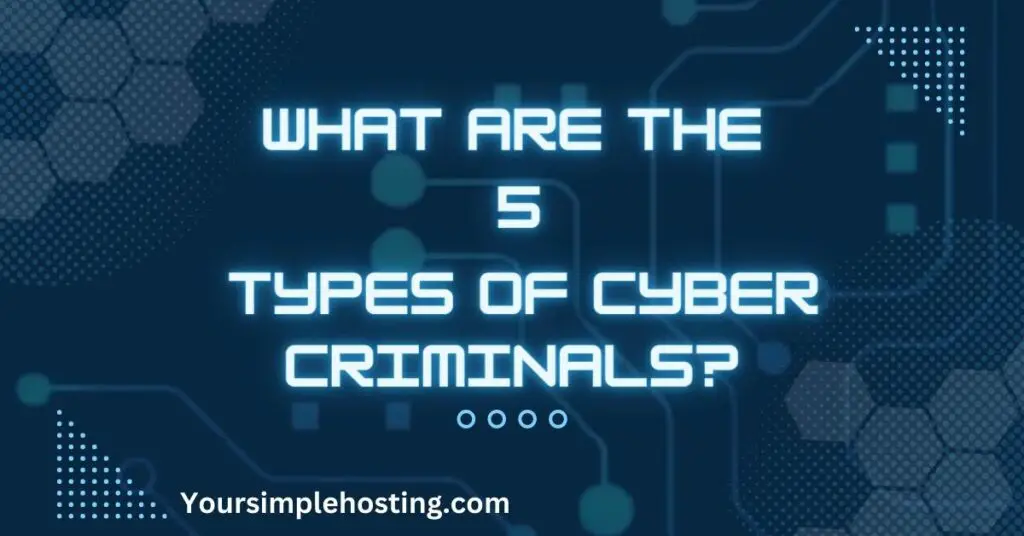Are you curious about the different types of cyber criminals? Knowing about them is essential so you can protect yourself from their attacks. Cybercrime is a constantly evolving threat, and these criminals are becoming more sophisticated and dangerous.
The list of 5 types of cyber criminals includes the hacker, the rogue employee, the ransom artist, the spear phisher, and the social engineer.
In this article, you learn about these five types of cyber criminals in detail, along with their tactics and how they can impact your online security. In addition, this article will provide you with tips on how to protect yourself from them.
From opportunistic hackers to organized cybercrime syndicates, understanding the motivations and methods of these criminals can help keep you and your digital assets safe.

Table of Contents
List of 5 Types of Cyber Criminals
Let’s take a look at these five types of cyber criminals listed below:
1. The Hacker
A hacker is a cyber criminal who uses computer skills to gain unauthorized access to computer systems, networks, and data. They may do this for a variety of reasons, such as stealing sensitive information, disrupting systems or networks, or spreading malware.
Hackers often use techniques such as phishing, social engineering, and exploiting vulnerabilities in software to gain access to their target systems. Once they have access, they may install malware, steal data, or cause other types of damage.
Some hackers are motivated by financial gain, while others may have more ideological or political motives. However, hacking can seriously affect individuals, businesses, and governments regardless of their motives.
How To Protect Yourself?
To protect yourself from hackers, it’s important to use strong passwords, keep your software up to date, be cautious about clicking on links or downloading attachments from unknown sources, and use reputable antivirus software.
2. The Rogue Employee
A rogue employee is a type of cyber criminal who is already authorized to access a computer system, network, or data but uses their access for malicious purposes. For example, they may abuse their privileges to steal sensitive information, tamper with data, or cause damage to the system or network.
Rogue employees may be motivated by financial gain, revenge, or other personal reasons. They may also be coerced or bribed by outside attackers to provide access to the system or steal information.
How To Protect Yourself?
Organizations need to have strong security protocols to prevent rogue employees from causing harm.
This includes limiting access to sensitive data, monitoring employee activity on the system, and providing training on cybersecurity best practices. It’s also important to have a plan in place for dealing with rogue employees if they are detected.
3. The Ransom Artist
A ransom artist is a type of cyber criminal who uses malicious software, also known as ransomware, to infect and encrypt files on a victim’s computer or network. Once the files are encrypted, the criminal demands payment, typically in the form of cryptocurrency, in exchange for the decryption key that will unlock the files.
Ransom artists often target individuals and organizations they believe are willing to pay a large sum to regain access to their valuable files and data. They may use various tactics, such as social engineering or phishing emails, to trick the victim into clicking on a malicious link or downloading an infected attachment.
How To Protect Yourself?
The consequences of a successful ransomware attack can be severe, resulting in the loss of important files and data and the payment of a hefty ransom. Therefore, individuals and organizations need to take steps to protect themselves from ransomware attacks, such as regularly backing up their data, using antivirus software, and being cautious when clicking on links or downloading attachments from unknown sources.
4. The Spear Phisher
A spear phisher is a type of cyber criminal who targets specific individuals or groups through email, social media, or other forms of communication. They use personalized and convincing messages to trick their victims into revealing sensitive information or downloading malicious software.
Spear phishers do their research beforehand, using publicly available information and social engineering tactics to gather information about their targets. They then craft messages tailored to their victims’ interests or concerns, making them more likely to click links or download malware attachments.
How To Protect Yourself?
The consequences of a successful spear phishing attack can be severe, as the criminal may gain access to sensitive information such as login credentials, financial data, or personal information. Therefore, it is essential to be cautious when receiving emails or messages from unknown sources and to verify the authenticity of any requests for information or action before responding. It is also important to regularly update software and use antivirus software to protect against malware.
5. The Social Engineer
A social engineer is a type of cyber criminal who uses psychological manipulation to trick individuals or organizations into divulging sensitive information or performing actions that are against their best interests.
Social engineers may use various tactics to gain their victims’ trust, such as pretending to be a trusted authority figure, using flattery or sympathy, or creating a sense of urgency. They may also use publicly available information, such as social media profiles, to tailor their messages and make them more convincing.
How To Protect Yourself?
The consequences of a successful social engineering attack can be severe, as the criminal may gain access to sensitive information, such as login credentials, financial data, or personal information.
It is essential to be cautious when receiving requests for information or actions, especially if they are unexpected or seem too good to be true. It is also important to regularly update software and use antivirus software to protect against malware.

Stay Safe Online: Know What to Do If You Think You’ve Been Cyber Attacked
If you suspect you have been a victim of a cyber attack, it’s vital to take action as soon as possible to protect yourself and your information.
First, disconnect your device from the internet to prevent further damage or data access. Then, run a scan with your antivirus software to detect and remove any malware or viruses that may have been installed on your device.
Next, change your passwords for all your accounts, especially those that may have been compromised. Finally, enable two-factor authentication for added security.
If you think your personal information has been stolen, such as credit card or social security numbers, notify your bank and credit card companies immediately to monitor for any unauthorized transactions or activity.
Lastly, consider reporting the cyber attack to the relevant authorities, such as the police or a cyber crime reporting agency in your country. This can help to prevent similar attacks from happening to others.
Remember, cyber attacks can be stressful and overwhelming, but taking prompt action can help mitigate the damage and protect your information in the future.
Conclusion
In conclusion, understanding the different types of cyber criminals is crucial in protecting ourselves and our digital assets. Whether it’s the thrill-seeking script teenager or the financially motivated cyber extortionist, each type of cyber criminal poses a unique threat to our online safety.
By staying informed and implementing strong cybersecurity measures, we can better safeguard our sensitive information and prevent falling victim to cybercrime. Remember, prevention is always better than cure, and investing in cybersecurity is an investment in our digital future. Stay safe online!

Leave a Reply